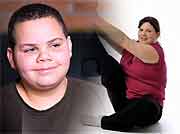- 8 Ways to Increase Dopamine Naturally
- 7 Best Breads for Maintaining Stable Blood Sugar
- Gelatin vs. Collagen: Which is Best for Skin, Nails, and Joints?
- The Long-Term Effects of Daily Turmeric Supplements on Liver Health
- Could Your Grocery Store Meat Be Causing Recurring UTIs?
- Are You Making This Expensive Thermostat Error This Winter?
- Recognizing the Signs of Hypothyroidism
- 10 Strategies to Overcome Insomnia
- Could Artificial Sweeteners Be Aging the Brain Faster?
- Techniques for Soothing Your Nervous System
Many Parents of Obese Children Underestimate Their Weight


Half the parents of overweight or obese children don’t think their kids have a weight problem, a new analysis reveals.
A review of 69 previous studies found that nearly 51 percent of parents with overweight or obese children tended to underestimate their child’s excess weight.
“They thought their children were of normal weight when their children’s BMI indicated that they are either overweight or obese,” said Dr. Rachel Thornton, a clinical pediatrician and assistant professor of pediatrics at Johns Hopkins School of Medicine.
“In my clinical practice, I am not surprised by that finding,” said Thornton, who was not involved with the study. “Parents tend to think a child who is overweight is actually normal weight.”
Body-mass index (BMI) is a measurement of body fat based on height and weight.
The effect went the other way as well, according to researcher Alyssa Lundahl and colleagues at the University of Nebraska. They conducted the evidence review, which was published online Feb. 3 and in the March print issue of the journal Pediatrics.
One in seven parents of normal-weight children in the studies worried that their child might be too skinny, the researchers found.
Parents might have a hard time assessing their child’s weight because childhood obesity has become so commonplace, the researchers said. More than a third of children in the United States are overweight or obese, according to the U.S. Centers for Disease Control and Prevention.
“Parents are seeing other children like their own, and think it is normal,” Thornton said. “On the other hand, I have had parents come in concerned that their child is underweight because they are thinner than the other kids on the playground.”
The parents also might believe their child simply has “baby fat” that they will outgrow, Thornton said. “They believe a toddler that is a little chubby is going to grow out of it, because it’s just baby fat,” she said.
The researchers found that parents were more likely to underestimate the overweight or obese status of kids aged 2 to 5 years, but became more accurate in their ability to assess their child’s weight as the child grew older.
The problem is, young kids with excess weight tend to carry those extra pounds into adolescence and adulthood, the study authors said.
With that extra weight comes an increased risk of heart disease, diabetes, arthritis and cancer, according to the CDC.
These findings show that pediatricians need to take a more active role in counseling parents about their children’s weight problems, said Marlo Mittler, a registered dietitian in pediatric and adolescent medicine at Cohen Children’s Medical Center of New York, in New Hyde Park.
“Pediatricians need to be more firm in saying, ‘Your kid is in trouble. Let’s take a look at this BMI chart and pinpoint the problem,’ ” Mittler said.
In particular, pediatricians need to start using BMI charts more often to check a child’s weight, Thornton said.
“It’s important for us to use those measurements and not simply rely on the way a child looks, because during different stages of development a child is supposed to have a different body shape than a typical adult,” she said.
Pediatricians should not pull their punches when it comes to childhood obesity, Thornton said. They need to be straight with parents about the health problems their children will face if their weight isn’t addressed.
“Pediatricians need to inform parents of their children’s weight status when they are overweight,” she said. “Generally, parents are looking to the doctor to give them an assessment of whether their child’s weight is appropriate or not.”
In turn, Mittler said, parents must be ready to act if their pediatrician warns them of a health problem.
“We need to not make light of it. We need to be more proactive,” she said. “It’s never too early to start. It’s OK to introduce young children to fish and grilled chicken and salad, not just things that are off the kids’ menu like mac and cheese.”
More information
For more about childhood obesity, visit the U.S. Centers for Disease Control and Prevention.
Source: HealthDay
Copyright © 2026 HealthDay. All rights reserved.










